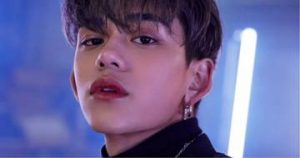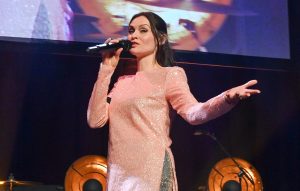Camera Obscura have released new single ‘We’re Gonna Make It In A Man’s World’. Check it out below, along with frontwoman Tracyanne Campbell telling us about what went into ‘Look To The East, Look To The West’ – the Scottish indie legends’ first new album in over a decade.
The group’s new single, which comes ahead of the album’s release on May 3 via Verge Records, began life as part of the soundtrack for Icarus (After Amelia), a visual study of women’s labour in Glasgow by Margaret Salmon. When asked to meet up with the filmmaker by a mutual friend, Campbell admitted she had her reservations. “I was terrified of this academic filmmaker!” she told NME. “But Margaret and I started going for walks in the countryside and I think we really clicked.”
Taking inspiration from the themes of the film, Campbell explained: “It’s not specifically about my experience as a woman in the music business, but it was a tongue in cheek approach to that kind of thing.
“I don’t live my life every day thinking ‘I’m so hard done by’, but I was thinking about who I am in the world. The film is about what women are and aren’t paid for, and I realised that as a woman of a certain age I was the one washing the dishes, making the dinner and being a mum, and looking after grandparents who need it. It spoke to me.”
Having released their last album ‘Desire Lines’ in 2013, the band went on hiatus two years later following the death of their keyboard player Carey Lander from osteosarcoma, a rare form of bone cancer. The album track ‘Sugar Almond’ is written directly about her. “I had a lot of trouble coming to terms with Carey’s death,” Campbell said. “Coming to terms with that affected my identity. The band had been everything to me. I was trying to figure out who I was without the band, and who I was without her. [The surviving band members] were still in touch with each other, but we weren’t really talking in a musical way.”
It was after a one-off show as part of long-term friends Belle & Sebastian’s Boaty Weekender cruise in 2019 (with two warm-up gigs that also served as fundraisers for the charity Sarcoma UK) that the band discussed making music together again. They enlisted Donna Maciocia, formerly of Amplifico, as Lander’s successor. “Obviously it was a sensitive thing, getting another player in,” Campbell said, “but we had it on good authority that she’s a great musician, a great team player, she’s sensitive, she can read a room. We just clicked straight away.”
Campbell continued: “Ultimately, it did make us feel quite fresh. Not quite starting again, but getting a new chance.”
This is reflected in the record’s cover, which features the same woman – Fiona Morrison – who appeared on Camera Obscura’s 2000 debut ‘Biggest Bluest Hi-Fi’. “It was Kenny [McKeeve, guitarist]’s idea. We thought of it as representing the band’s journey. And also, putting a woman who’s in her late 40s on the front cover of a record, I felt that was a good thing as well.”
The first single from the album was January’s country-inflected ‘Big Love’. Before its release, Campbell admitted that there were nerves in the group about returning after a decade, without their former bandmate: “I think we’ve probably had more radio play than with any other song. I can’t believe how well it’s been received,” Campbell said.
NME: Hello Tracyanne. Camera Obscura first returned from hiatus in 2019 with a couple of small fundraising shows ahead of Belle & Sebastian’s Boaty Weekender. Can you tell us about that time?
Tracyanne Campbell: “We hadn’t played in a long time. We’d all been very sensitive around the subject, but we started rehearsing and found we were really enjoying playing together again. We thought we’d better do some warm-ups, so we decided to do them for the charities that Carey was involved in. Those gigs were amazing. We were very, very nervous about getting back onstage, in front of Carey’s mum and dad, all our family and friends, but there was a real energy in the room. People had come from all over the world. It was a wee venue, but it felt quite international, as did getting on the boat and playing that show.”
It sounds like it was quite cathartic?
“Very. I’m not saying I didn’t enjoy playing live before, I did have my moments, but it was one of those things where you’ve had something taken away from you and so you start to appreciate the things you forgot to appreciate along the way. It’s cheesy, but I really felt a connection with the audience on a level that I’d never experienced before, like we were all part of a gang, all on the same team.”
At what point did it become apparent that the shows were going to lead to a new album, too?
“I’d written dribs and drabs of songs before and hadn’t done anything with them, but I was really inspired by the freshness of going into the rehearsals and really enjoying it. The songs just started to pour out of me. I could feel that something was being churned up, things were starting to loosen up creatively. So we started talking about whether we were actually going to try and make a new record.
“It was a big risk; it was actually quite scary to start having those conversations. But I didn’t want to write songs in vain, for them to just be on a tape recorder on my phone with nobody listening to them. They needed a home, and the best home for them would be on a Camera Obscura record, because we’ve all been intertwined in each other’s lives for the past 30 years. Obviously, the experience of Carey’s death really had a massive impact on all of us. I feel like I had a sense of duty to allow those songs to live and breathe with those other members of the band.”
The band also includes a new member in Donna Maciocia, who’s taken over Carey’s role on keys since the 2019 gigs. How has her addition changed the band?
“She brought a freshness musically. The rest of the band are people that happen to write and play songs, but she’s a proper musician. She brought a professionalism, but she also made it fun. I think we had a tendency to be a bit uptight in the past, we weren’t great at being open and communicative in our rehearsal space, and she managed to lighten everything up a bit. She asked me to mentor her own songwriting, so we started doing this tit for tat thing where she’d send me a song and I’d be blown away by it, thinking ‘I need to up my game!’ And then I’d try and write a song and bring it back to her. She helped me find my confidence again.”
How does that increased confidence manifest itself in the new album?
“It makes it bolder, but it’s also allowed me to be less of a control freak. A lot of our vibe [in the past] was caught up in my anxieties, and with anxiety you have a desire to control things because you need to feel safe. Now I’ve learned to loosen up a bit, and not feel like I have to be so much in control. In the past I was all over the record and wanted to get my way, but I’ve learned that maybe it’s alright that I’m good at writing the basic song, with a lyric and a melody and a structure, then other musicians can come to the forefront too and do their thing. Confidence allows you to take a step back sometimes, and to have trust in people and yourself.”
Can we hear that emphasis on others’ contributions on the record?
“I hope so! I think the musicianship is a step up for us, and obviously we’ve got a new player in Donna. It was important for us that if we had a new member that we didn’t have her in a corner telling her what to do. Jari [Haapalainen, producer] had a lot of freedom to do what he wanted as well. He really does produce; it’s not just twiddling knobs.”
How does Jari’s creativity come through?
“I really felt that I needed my hand held a bit with this record. I’ve always felt that a little bit, to be honest. It was scary to get back in the room and I was still finding my confidence again with writing songs, thinking ‘Is this shit? Has it got legs?’ and not always knowing the answer. We had him in from the very beginning of the songwriting process. He’d push a bit, like ‘I don’t think that’s so good,’ or ‘the chorus is a bit weak’. He really got involved.”
You’ve worked with him before on ‘Let’s Get Out of This Country’and ‘My Maudlin Career’ – were you seeking a sense of familiarity?
“Yes. But we did have a bit of a dilemma, because we were kind of thinking, ‘Is that too easy?’ But it was more about him understanding the sensitivity of our situation. Making a record without Carey, understanding the loss of that, managing a new member and making everybody feel like it’s their record. He’s a really good manager of a space.”
Do you see this return from hiatus as a long-term thing? Are you looking beyond this album with Camera Obscura?
“I would like to think so. Logistically it’s a struggle because people are working other jobs and all that, but I feel that if I’m writing songs and they’re coming from real places and it’s not laborious, then I want to continue. What I was asking myself with this record is, ‘Who am I?’ And I guess who I am is somebody who wants to make records.”
Camera Obscura release ‘Look To The East Look To The West’ on May 3 via Verge Records
The post Camera Obscura share new single and talk “not quite starting again, but getting a new chance” appeared first on NME.




